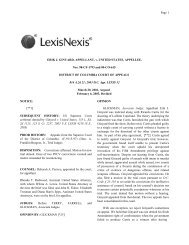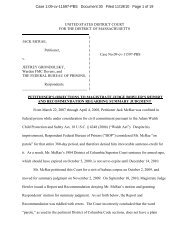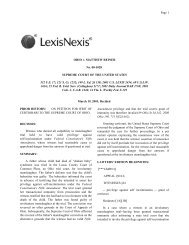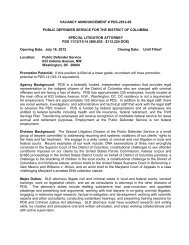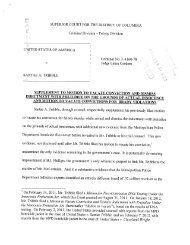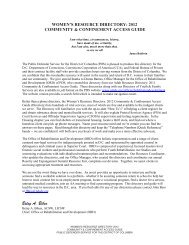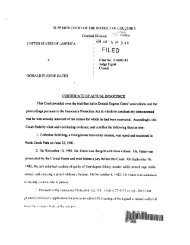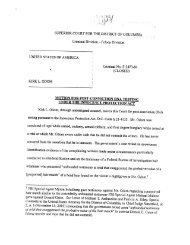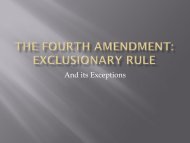Plaintiff's Motion for Partial Summary Judgment - Public Defender ...
Plaintiff's Motion for Partial Summary Judgment - Public Defender ...
Plaintiff's Motion for Partial Summary Judgment - Public Defender ...
Create successful ePaper yourself
Turn your PDF publications into a flip-book with our unique Google optimized e-Paper software.
Case 1:11-cv-01464-BAH Document 12 Filed 09/30/11 Page 5 of 2913. By that time, however—unbeknownst to Mr. Wills—the Parole Commission had alreadyimposed the Special Sex Offender Aftercare Condition as a condition of Mr. Wills‟ supervisedrelease. It did so on January 6, 2009, through a Notice of Action that read in part:In the case of the above-named, the following action was ordered: . . . [Y]ou shallbe subject to the Special Sex Offender Aftercare Condition. You shall participatein an in-patient or out-patient mental health program as directed by your[CSOSA] Supervision Officer, with special emphasis on long-term sex offendertesting and treatment. You are expected to acknowledge your need <strong>for</strong> treatmentand to participate in good faith in achieving the program goals that will beestablished <strong>for</strong> you.Ex. 4 (Jan. 6, 2009 Parole Commission Notice of Action).14. The Parole Commission provided Mr. Wills no process prior to imposing the Special SexOffender Aftercare Condition. It gave him no advance notice that the condition would beimposed, no disclosure of any evidence supporting the condition, no hearing at which he couldcontest the condition by calling or cross-examining witnesses, and no statement of reasonsjustifying it.15. On February 9, 2009, Mr. Wills‟ CSOSA supervising officer made the followingRunning Record entry regarding the Special Sex Offender Aftercare Condition:Ex. 5.[Parole Commission] [c]ase analyst Corey Mitchell returns this officer‟stelephone call concerning the [Parole Commission Notice of Action] dated 1/6/09.He confirms that they too have the same conditions ordered but have no reasonslisted just as this officer has no reasoning on the <strong>for</strong>m.16. CSOSA transferred Mr. Wills to its Sex Offender Unit on February 18, 2009. Ex. 6 (Feb.18, 2009 CSOSA Running Record entry).17. Having never received notice of the Special Sex Offender Aftercare Condition, Mr. Willswas surprised by this transfer, as reflected in CSOSA‟s February 23, 2009, Running Record5
Case 1:11-cv-01464-BAH Document 12 Filed 09/30/11 Page 6 of 29entry: “Mr. Wills is confronted with his NOA dated 1/6/09 and the special conditions added. Hewas unaware of any other than drug aftercare.” Ex. 7.Id.18. Mr. Wills‟ supervising officer added:Offender is in<strong>for</strong>med that [the condition] may have been added due to past“assault with intent to rape” charge that was dismissed. Mr. Wills is told thatfurther contact will be made to USPC to confirm these special conditions but thatMr. Mitchell from USPC confirmed that they were in fact there.19. On March 9, 2009, Mr. Wills‟ supervising officer required him to in<strong>for</strong>m his thengirlfriend,with whom he was residing, of the “nature of [his] sex offense”—despite the fact thathe had never been convicted of a sex offense. Ex. 8 (March 9, 2009 CSOSA Running Recordentry).20. On May 14, 2009, Mr. Wills‟ supervising officer met in person with his girlfriend toconfirm that she was “aware[] of offender‟s supervision conditions and sex offense.” Ex. 9 (May14, 2009 CSOSA Running Record entry). This compelled disclosure of inaccurate in<strong>for</strong>mationcaused a significant strain in Mr. Wills‟ relationship with his girlfriend. Ex. 10 (Wills Dec.) 7.Their relationship has since ended. Id.21. The disclosure comported with the policy of CSOSA‟s Sex Offender Unit, which is to“notify all persons with whom the offender resides about the offender‟s supervision status,” andto “have communication with all [of the supervisee‟s] identified collateral contacts within 30calendar days of the initial supervision visit.” Ex. 11 (CSOSA Policy Manual on Sex OffenderSupervision) at 4.22. CSOSA soon began to en<strong>for</strong>ce the Special Sex Offender Aftercare Condition. It startedby scheduling Mr. Wills <strong>for</strong> an “assessment package” consisting of six sessions with a CSOSApaidtreatment provider at the Center <strong>for</strong> Clinical and Forensic Services (“CCFS”) and two6
Case 1:11-cv-01464-BAH Document 12 Filed 09/30/11 Page 8 of 2928. On December 7, 2009, Mr. Wills was arrested <strong>for</strong> violating the terms of his supervisedrelease, based on an October 4, 2009, arrest <strong>for</strong> drug possession. On March 29, 2010, he wasconvicted in Superior Court of misdemeanor possession of cocaine and drug paraphernalia, andthe Parole Commission <strong>for</strong>mally revoked his supervised release on June 18, 2010. Mr. Wills wasincarcerated until December 1, 2010, when he returned to the community and began a new 52-month term of supervised release.D. Defendants’ 2011 Imposition and En<strong>for</strong>cement of the Special Sex OffenderAftercare Condition.29. Upon Mr. Wills‟ release, the Parole Commission did not immediately re-impose theSpecial Sex Offender Aftercare Condition. Ex. 16 (June 18, 2010 Parole Commission Notice ofAction). Nonetheless, CSOSA placed Mr. Wills back in its Sex Offender Unit.30. On May 23, 2011, when the Parole Commission still had not re-imposed the Special SexOffender Aftercare Condition, Mr. Wills‟ supervising officer in<strong>for</strong>med him that CSOSAintended to petition the Parole Commission to do so. Mr. Wills indicated his objection to theproposed modification on a <strong>for</strong>m that his supervising officer provided to him. Ex. 17 (June 6,2011 CSOSA submission to Parole Commission).31. On June 2, 2011, Mr. Wills addressed a letter to the Parole Commission providing thebasis <strong>for</strong> his objection: “I do not believe that I should be subject to this condition because I havenever been convicted of a sex crime and am there<strong>for</strong>e not in need of treatment <strong>for</strong> sex offenders.”Id.32. On June 6, 2011, Mr. Wills‟ supervising officer <strong>for</strong>mally petitioned the ParoleCommission to add the Special Sex Offender Aftercare Condition. The officer wrote, in part:Mr. Wills was released to supervision on December 1, 2010 and was assigned tothe Special Sex Offender Supervision Unit due to his being charged with Assaultwith Intent to Rape in Docket # 1984-FEL-1071. This charge was dismissed on8
Case 1:11-cv-01464-BAH Document 12 Filed 09/30/11 Page 9 of 29January 30, 1986. However, according to CSOSA policy, he will be supervised inthe Sex Offender Unit until a complete risk and needs assessment can beconducted.Id. The officer also cited a “deception indicated” finding on Mr. Wills‟ October 2009 polygraphexamination as a reason <strong>for</strong> his continued supervision in the Sex Offender Unit. Id. The officerattached Mr. Wills‟ letter of objection to his submission to the Parole Commission. Id.33. On June 24, 2011, the Parole Commission granted CSOSA‟s request to re-impose theSpecial Sex Offender Aftercare Condition. Ex. 1 (June 24, 2011 Parole Commission Notice ofAction).34. Although Mr. Wills had the opportunity to file a brief written objection prior to the ParoleCommission‟s re-imposition of the condition, the Commission offered him no hearing, noopportunity to call or cross-examine witnesses, no chance to review or challenge the evidenceallegedly supporting the condition, and no meaningful statement of reasons. It also made clear,in its June 24, 2011, Notice of Action, that its decision was not appealable to the Commission‟sNational Appeals Board. Id.35. On July 25, 2011, Mr. Wills‟ CSOSA supervising officer notified him that his sexoffender treatment would soon begin again. The officer told him that if he did not sign a <strong>for</strong>mwaiving his right to therapist-patient confidentiality, he would be in violation of the terms of hissupervised release. Ex. 10 (Wills Dec.) 8.36. On August 12, 2011, Mr. Wills filed a Complaint and <strong>Motion</strong> <strong>for</strong> Preliminary Injunction,in which he asked this Court to preliminarily enjoin en<strong>for</strong>cement of the Special Sex OffenderAftercare Condition.37. In early September 2011, Mr. Wills‟ CSOSA supervising officer contacted Mr. Wills‟outside mental health treatment provider, Careco Mental Health Services, and disclosed to his9
Case 1:11-cv-01464-BAH Document 12 Filed 09/30/11 Page 10 of 29case manager there that CSOSA intended to put Mr. Wills through sex offender treatment. Id. 9.38. On September 7, 2011, two days be<strong>for</strong>e Defendants‟ response to Mr. Wills‟ <strong>Motion</strong> <strong>for</strong>Preliminary Injunction was due, the Parole Commission issued a Notice of Action that removedthe Special Sex Offender Aftercare Condition from the terms of Mr. Wills‟ supervised release.39. On September 8, 2011, Mr. Wills withdrew his <strong>Motion</strong> <strong>for</strong> Preliminary Injunction, whilenoting that the withdrawal was without prejudice to the claims <strong>for</strong> declaratory and permanentinjunctive relief set <strong>for</strong>th in his Complaint.ARGUMENTMr. Wills moves <strong>for</strong> summary judgment on his claim that the Parole Commissionimposed the Special Sex Offender Aftercare Condition in violation of his Fifth Amendment rightto procedural due process.I. <strong>Summary</strong> <strong>Judgment</strong> Standard“Pursuant to Federal Rule of Civil Procedure 56, the Court will grant a motion <strong>for</strong>summary judgment „if the movant shows that there is no genuine dispute as to any material factand the movant is entitled to judgment as a matter of law‟ based upon the pleadings, depositions,and affidavits and other factual materials in the record.” AFGE, AFL-CIO, Local 2798 v. Pope,2011 U.S. Dist. LEXIS 98103, at *15 (D.D.C. Sept. 1, 2011) (citing Fed. R. Civ. P. 56(a), (c)).“<strong>Summary</strong> judgment procedure is properly regarded not as a disfavored proceduralshortcut, but rather as an integral part of the Federal Rules as a whole, which are designed tosecure the just, speedy and inexpensive determination of every action.” Celotex Corp. v. Catrett,477 U.S. 317, 327 (1986) (internal quotation marks omitted).10
Case 1:11-cv-01464-BAH Document 12 Filed 09/30/11 Page 11 of 29II.There Is No Genuine Dispute as to Any Material Fact.“[T]he dispute about a material fact is „genuine‟ . . . if the evidence is such that areasonable jury could return a verdict <strong>for</strong> the nonmoving party.” Anderson v. Liberty Lobby,Inc., 477 U.S. 242, 248 (1986). There is no such dispute regarding any fact underlying Mr.Wills‟ procedural due process claim. Each can be found in one of three places: Defendants‟ ownrecords, the public record, or Mr. Wills‟ declaration. And, as discussed at length below, giventhose facts and the overwhelming law in his favor, no reasonable factfinder could return a verdict<strong>for</strong> Defendants on Mr. Wills‟ procedural due process claim, which is as simple as it is certain:the Parole Commission has twice imposed sex offender treatment on Mr. Wills—who has neverbeen convicted of a sex offense—without ever providing him basic procedural protections.III. Mr. Wills Is Entitled to <strong>Judgment</strong> as a Matter of Law on His Procedural Due ProcessClaim.“Procedural due process imposes constraints on governmental decisions which depriveindividuals of liberty or property interests within the meaning of the Due Process Clause of theFifth or Fourteenth Amendment.” Mathews v. Eldridge, 424 U.S. 319, 332 (1976) (internalquotation marks omitted). Courts “examine procedural due process questions in two steps: thefirst asks whether there exists a liberty or property interest which has been interfered with by theState, [and] the second examines whether the procedures attendant upon that deprivation wereconstitutionally sufficient.” Kentucky Dep’t of Corrections v. Thompson, 490 U.S. 454, 460(1989) (citation omitted).A. Every Circuit Court To Consider the Issue Has Held that a Person in Mr. Wills’Position Is Constitutionally Due Far More Process than the Parole CommissionProvided Him.Four federal courts of appeals—the Third, Fifth, Ninth, and Tenth Circuits—haveconsidered the question presented here: how much process the government must provide a11
Case 1:11-cv-01464-BAH Document 12 Filed 09/30/11 Page 12 of 29prisoner or conditional releasee who, like Mr. Wills, has never been convicted of a sex offense,be<strong>for</strong>e it may subject him to sex offender classification and treatment. Every one of those courtshas concluded that, given the liberty interests at stake, the government must provide at least thefollowing procedural safeguards: advance written notice of the condition; disclosure of theevidence against the supervisee; a hearing at which he can call witnesses and presentdocumentary evidence; and a written statement of findings.Despite twice subjecting him to the Special Sex Offender Aftercare Condition, the ParoleCommission has never come close to providing that minimum process to Mr. Wills.1. Courts Have Identified a Liberty Interest in Avoiding the Compelled MentalHealth Treatment and Stigma Associated with Sex Offender Treatment.Every Circuit to consider the issue has held that when the state classifies individuals as“sex offenders” and requires them to undergo sex offender treatment, it implicates their interestin avoiding compelled mental health treatment and in avoiding the “stigma” associated withclassification and treatment as a sex offender. These courts have grounded their holdings on theSupreme Court‟s seminal decision in Vitek v. Jones, 445 U.S. 480 (1980). There, the Court heldthat the government must provide a prisoner procedural safeguards prior to transferring him to amental hospital and mandating that he undergo mental health treatment, <strong>for</strong>the stigmatizing consequences of a transfer to a mental hospital <strong>for</strong> involuntarypsychiatric treatment, coupled with the subjection of the prisoner to mandatorybehavior modification as a treatment <strong>for</strong> mental illness, constitute the kind ofdeprivations of liberty that requires procedural protections.Id. at 494. The Court reasoned that “[c]ompelled treatment in the <strong>for</strong>m of mandatory behaviormodification programs”—of which the Special Sex Offender Aftercare Condition at issue here isa prime example—implicate “the right to be free from, and to obtain judicial relief <strong>for</strong>,unjustified intrusions on personal security,” which is “among the historic liberties protected by12
Case 1:11-cv-01464-BAH Document 12 Filed 09/30/11 Page 15 of 29modification therapy, triggers an independent liberty interest emanating from the Due ProcessClause of the Fourteenth Amendment,” id. at 328.The Circuits that have considered the issue, then, are unanimous in holding that a personnever convicted of a sex offense has a liberty interest in avoiding sex offender treatment. Cf.Chandler v. James, 2011 U.S. Dist. LEXIS 47746, at *27 (D.D.C. May 4, 2011) (“Severalcourts, although none yet in this circuit, have found that a prisoner or parolee has a libertyinterest in not being classified as a sex offender and required to undergo psychological treatmentdesigned <strong>for</strong> sex offenders; consequently, be<strong>for</strong>e he can be so classified and ordered to submit totreatment, the prisoner/parolee must be af<strong>for</strong>ded due process.”).2. In Light of the Liberty Interests at Stake, Courts Have Consistently HeldThat a Person in Mr. Wills’ Position Is Due Far More Process than theParole Commission Provided Him.Federal courts of appeals have been similarly uni<strong>for</strong>m in holding that, prior to imposingsex offender classification and treatment on a person never convicted of a sex offense, thegovernment must provide the person dramatically more process than the Parole Commission hasprovided to Mr. Wills. In the Fifth Circuit, <strong>for</strong> instance, prior to “requiring a parolee who has notbeen convicted of a sex offense to register as a sex offender or participate in sex offendertherapy,” the state parole board must provide him:(1) written notice that sex offender conditions may be imposed as a condition ofhis mandatory supervision; (2) disclosure of the evidence being presented against[him] to enable him to marshal the facts asserted against him and prepare adefense; (3) a hearing at which [he] is permitted to be heard in person, presentdocumentary evidence, and call witnesses; (4) the right to confront and crossexaminewitnesses, unless good cause is shown why this right should not begranted; (5) an impartial decision maker . . . ; and (6) a written statement by thefactfinder as to the evidence relied on and the reasons it attached sex offenderconditions to his mandatory supervision.15
Case 1:11-cv-01464-BAH Document 12 Filed 09/30/11 Page 16 of 29Meza, 607 F.3d at 411. The Third Circuit‟s standard is nearly identical. There, prior to imposingsex offender treatment and classification on a prisoner, the government must provide him:(1) written notice . . . that Defendants are considering classifying him as a sexoffender and mandating his participation in [the sex offender treatment program];(2) a hearing, held sufficiently after the notice to permit [him] to prepare, whichincludes: disclosure of the evidence Defendants would rely upon <strong>for</strong> theclassification, and an opportunity <strong>for</strong> [him] to be heard in person and to presentdocumentary evidence; (3) an opportunity to present witness testimony and toconfront and cross-examine witnesses called by Defendants, “except upon afinding, not arbitrarily made, of good cause <strong>for</strong> not permitting such presentation,confrontation, or cross-examination”; (4) administration of the hearing by anindependent decisionmaker; (5) rendering of a written statement by thedecisionmaker as to the evidence relied on and the reasons <strong>for</strong> [his] classification;and (6) “[e]ffective and timely notice of all the <strong>for</strong>egoing rights.”Renchenski, 622 F.3d at 331 (quoting Vitek, 445 U.S. at 494-95).The other two Circuits to consider the issue have required process that is only marginallyless robust. In the Tenth Circuit, prior to classifying and treating a prisoner as a sex offender, thegovernment must provide:notice of the charges, an opportunity to present witnesses and evidence in defenseof those charges, and a written statement by the factfinder of the evidence reliedon and the reasons <strong>for</strong> the disciplinary action. . . . Additionally, in order tocomport with due process, there must be some evidence to support the hearingpanel‟s decision, and the decisionmaker must be impartial.Gwinn, 354 F.3d at 1219 (internal citations omitted). The Ninth Circuit, similarly, has held thatprisoners without sex convictions must receive advance written notice that treatment may beimposed, disclosure of the evidence against them, a hearing at which they can presentdocumentary evidence and call witnesses, and a written statement of findings. Neal, 131 F.3d at830-31. 55 It stands to reason that Gwinn and Neal, where the plaintiffs were prisoners, prescribe slightlyless process than Meza, where the plaintiff was a parolee, because “parolees are owed moreprocess than inmates.” Meza, 607 F.3d at 408. As a supervised releasee, Mr. Wills is entitled to16
Case 1:11-cv-01464-BAH Document 12 Filed 09/30/11 Page 17 of 29The Parole Commission has plainly failed to meet even the minimum proceduralrequirements set <strong>for</strong>th in Neal. Mr. Wills has never been provided a hearing at which he couldcall witnesses and present evidence to challenge the appropriateness of his classification andtreatment as a sex offender, and he has never received a meaningful statement of reasons fromthe Parole Commission justifying the Special Sex Offender Aftercare Condition. Although hewas permitted to file a written objection to CSOSA‟s June 2011 request that the ParoleCommission re-impose the condition (he was provided no notice of any sort prior to theCommission‟s initial imposition of the condition, in January 2009), such cursory process is notnearly enough to justify a condition that intrudes so deeply on his significant liberty interests.See Neal, 131 F.3d at 830-31 (noting that “the fact that [plaintiff] wrote letters to the [sexoffender treatment program] administrator protesting the [sex offender] label does not begin tosatisfy the requirements” of due process).The constitutional violation, then, is manifest. Based on facts that are beyond dispute,Mr. Wills is due a judgment as a matter of law that the Parole Commission has violated his FifthAmendment right to procedural due process. 6B. A Formal Mathews Analysis Underscores the Strength of Mr. Wills’ Claim.Mr. Wills has established why, on the strength of every federal court of appeals decisionconsidering the issue, he is due judgment as a matter of law on his procedural due process claim.the process set <strong>for</strong>th in Meza, and it is that process that he requests in the Proposed Orderappended to this motion.6 It is also worth noting that the Parole Commission has failed to provide Mr. Wills processequivalent to that which federal district judges must provide supervised releasees prior toimposing or modifying any special conditions of supervised release: notice of the conditions andan adversarial hearing, with the assistance of counsel, at which the releasee may put on andcontest evidence regarding the suitability of the conditions. See Fed. R. Crim. Pro. 32(i);32.1(c)(1). This is significant because, by statute, the Parole Commission has “the sameauthority” over District of Columbia supervised releasees as district judges have over federalsupervised releasees. D.C. Code § 24-403.01(b)(6).17
Case 1:11-cv-01464-BAH Document 12 Filed 09/30/11 Page 18 of 29It will nonetheless be useful to briefly progress through a <strong>for</strong>mal Mathews analysis—which calls<strong>for</strong> balancing “(1) the private interest affected by the government action; (2) the risk of erroneousdeprivation and the value of additional safeguards; and (3) the government‟s interest, includingthe fiscal and financial burdens that additional or substitute procedural requirements wouldentail,” Propert v. District of Columbia, 948 F.2d 1327, 1332 (D.C. Cir. 1991) (citing Mathews,424 U.S. at 335)—in order to underscore the strength of the private interests at stake and the highrisk of error absent additional safeguards, which combine to far outweigh any governmentalinterests. 71. The Private Interests at Stake Are Compelling.The Special Sex Offender Aftercare Condition implicates at least three distinct privateinterests, each of which has been recognized as a significant liberty interest: Mr. Wills‟ right torefuse mental health treatment, his right to avoid the stigma of classification as a sex offender,and his right to maintain privacy in sexual matters. 8a. The Condition Infringes on Mr. Wills’ Right to Refuse Unwanted MentalHealth Treatment.Three Supreme Court cases provide the contours of the liberty interest in avoidingunwanted mental health treatment. In Vitek, discussed supra at 12-13, the Court held that“mandatory behavior modification programs” implicate the “right to be free from . . . unjustifiedintrusions on personal security,” which is “among the historic liberties protected by the Due7 Of the above-cited circuit court cases analyzing the process due a person in Mr. Wills‟situation, only Meza, discussed further below, engaged in a <strong>for</strong>mal Mathews analysis.8 The condition also infringes on Mr. Wills‟ First Amendment right to refrain from speaking, bycompelling Mr. Wills to “acknowledge [his] need” <strong>for</strong> sex offender treatment. See Rumsfeld v.Forum <strong>for</strong> Academic & Institutional Rights, Inc., 547 U.S. 47, 61 (2006) (“Some of this Court‟sleading First Amendment precedents have established the principle that freedom of speechprohibits the government from telling people what they must say.”). Mr. Wills asserts asubstantive First Amendment claim in his Complaint, but he does not make it a basis <strong>for</strong> thismotion.18
Case 1:11-cv-01464-BAH Document 12 Filed 09/30/11 Page 19 of 29Process Clause.” 445 U.S. at 492 (internal quotation marks omitted). In Parham v. J.R., 442U.S. 584, 600 (1979), where the Court considered what process a state must constitutionallyprovide to a minor prior to subjecting him to unwanted mental health treatment, the Courtrecognized a “substantial liberty interest in not being confined unnecessarily” <strong>for</strong> such treatment.Finally, in Washington v. Harper, 494 U.S. 210, 221-22 (1990), the Court held that prisonerspossess “a significant liberty interest in avoiding the unwanted administration of antipsychoticdrugs under the Due Process Clause of the Fourteenth Amendment.”In Cruzan v. Dir., Mo. Dep’t of Health, 497 U.S. 261, 278-79 (1990), the Court citedthose three cases as examples of its historical recognition of “[t]he principle that a competentperson has a constitutionally protected liberty interest in refusing unwanted medical treatment.”The Cruzan Court noted the longstanding nature of this right:Be<strong>for</strong>e the turn of the century, this Court observed that “no right is held moresacred, or is more carefully guarded, by the common law, than the right of everyindividual to the possession and control of his own person, free from all restraintor interference of others, unless by clear and unquestionable authority of law.”Union Pacific R. Co. v. Bots<strong>for</strong>d, 141 U.S. 250, 251 (1891). This notion of bodilyintegrity has been embodied in the requirement that in<strong>for</strong>med consent is generallyrequired <strong>for</strong> medical treatment.Id. at 269. 9Vitek and its brethren make clear that the “right of every individual to the possessionand control of his own person, free from all restraint or interference of others,” Bots<strong>for</strong>d, 1419 See also id. at 305 (Brennan, J., dissenting) (“The right to be free from medical attentionwithout consent . . . is deeply rooted in this Nation‟s traditions, as the majority acknowledges.”);Washington v. Glucksberg, 521 U.S. 702, 725 (1997) (citing “the long legal tradition protectingthe decision to refuse unwanted medical treatment” as grounded in “this Nation‟s history andconstitutional traditions”); Vacco v. Quill, 521 U.S. 793, 807 (1997) (acknowledging the “wellestablished,traditional rights to bodily integrity and freedom from unwanted touching”). Indeed,courts in this Circuit and elsewhere have referred to the right to refuse treatment as“fundamental.” See Smith v. Shalala, 954 F. Supp. 1, 3 (D.D.C. 1996) (“[C]ompetent adultshave a fundamental right to refuse medical treatment . . . .” (citing Cruzan)); Sundby v. Fiedler,827 F. Supp. 580, 583 (W.D. Wis. 1993) (holding, regarding compelled sex offender treatment,that “[t]he due process clause protects certain fundamental rights, one of which is the right to be19
Case 1:11-cv-01464-BAH Document 12 Filed 09/30/11 Page 20 of 29U.S. at 251, extends not just to government intrusions that impact the body, but to those thatwork on the mind as well.The Special Sex Offender Aftercare Condition is just such a governmental intrusion. Itinvolves “an in-patient or out-patient mental health program . . . with special emphasis on longtermsex offender testing and treatment.” Ex. 1 (June 24, 2011 Parole Commission Notice ofAction). CSOSA implements this “mental health program” through a “psychosexualassessment,” on which it bases a “clinical diagnosis” and a “comprehensive treatment plan.” Ex.11 (CSOSA Policy Manual) at 10-11. Mr. Wills underwent a psychosexual assessment,numerous sex offender treatment sessions, and a polygraph examination in the fall of 2009, and,until he filed this lawsuit, Defendants had him scheduled to begin treatment again. In the eventthat the Parole Commission re-imposes the condition, Mr. Wills‟ treatment may include furthercognitive behavioral therapy; “[u]se of techniques <strong>for</strong> reducing deviant sexual arousal, such ascovert sensitization, aversive conditioning and/or hormonal therapy”; and <strong>for</strong>ced “physiologicalmonitoring,” including “plethysmographs and polygraphs, etc.” Id. at 14-15. 10Should he“successfully complete[] sex offender treatment, [he] shall be placed into aftercare <strong>for</strong> anindefinite period of time.” Id. at 13.The Special Sex Offender Aftercare Condition is, in short, a government-compelledmental health treatment program, one that unquestionably implicates Mr. Wills‟ right to refusefree from unjustified bodily and mental intrusions” (citing Vitek and Harper)); In re A.C., 533A.2d 611, 615 (D.C. 1987) (“The fundamental right to bodily integrity encompasses an adult‟sright to refuse medical treatment . . . .”); cf. B. Jesse Hill, The Constitutional Right to MakeMedical Treatment Decisions: A Tale of Two Doctrines, 86 Tex. L. Rev. 277, 304 (2007) (“Theright to bodily integrity is one of the oldest fundamental rights recognized by the law.”).10 A plethysmograph is a device placed around the penis to measure changes in blood flow, andis used to assess a man‟s level of sexual arousal in response to various visual and auditorystimuli.20
Case 1:11-cv-01464-BAH Document 12 Filed 09/30/11 Page 21 of 29unwanted mental health treatment. See Renchenski, 622 F.3d at 327 (prison sex offendertreatment program that “consists of weekly psychotherapy sessions <strong>for</strong> approximately two years. . . is sufficiently similar to the <strong>for</strong>ced transfer to a mental institution that the Supreme Courtdetermined triggered a liberty interest in Vitek”).b. The Condition Stigmatizes Mr. Wills with the Label of “Sex Offender.”Mr. Wills has already established his liberty interest in avoiding the stigma of the label“sex offender.” See supra at 12-15; Vitek, 445 U.S. at 492 (“It is indisputable that commitmentto a mental hospital can engender adverse social consequences to the individual and . . . whetherwe label this phenomena “stigma” or choose to call it something else . . . we recognize that it canoccur and that it can have a very significant impact on the individual.” (internal quotation marksomitted)); Coleman, 395 F.3d at 223 (“As in Vitek, the state imposed stigmatizing [sex offender]classification and treatment on Coleman without providing him any process.”); Kirby, 195 F.3dat 1292 (“[T]he stigmatizing effect of being classified as a sex offender constitutes a deprivationof liberty under the Due Process Clause.”); Neal, 131 F.3d at 829 (court could “hardly conceiveof a state‟s action bearing more „stigmatizing consequences‟ than the labeling of a prison inmateas a sex offender”). 11These courts have made clear that mere labeling or classification of a person as a sexoffender—as Defendants have done to Mr. Wills by placing him in CSOSA‟s “Sex OffenderUnit” and ordering him to undergo “sex offender treatment”—is sufficient to implicate hisliberty interest in avoiding stigma. But Defendants have done more than just label Mr. Wills a“sex offender”; they have worked to publicize that false description. In March 2009, CSOSA11 But see Grennier v. Frank, 453 F.3d 442, 445 (7th Cir. 2006) (rejecting argument that “thestigma of being called a „sex offender‟ is enough by itself to deprive a person of liberty”);Gunderson v. Hvass, 339 F.3d 639, 644 (8th Cir. 2003) (“Damage to reputation alone . . . is notsufficient to invoke the procedural protections of the due process clause.”).21
Case 1:11-cv-01464-BAH Document 12 Filed 09/30/11 Page 22 of 29required Mr. Wills to in<strong>for</strong>m his then-girlfriend of the “nature of [his] sex offense,” Ex. 8 (March9, 2009 CSOSA Running Record entry)—despite the fact that he has never committed one. Twomonths later, Mr. Wills‟ supervising officer met in person with his girlfriend to confirm that shewas “aware[] of offender‟s supervision conditions and sex offense.” Ex. 9 (May 14, 2009CSOSA Running Record entry). Those disclosures caused a significant strain in Mr. Wills‟relationship with his girlfriend and contributed to its demise. Ex. 10 (Wills Dec.) 7. 12Finally,in early September 2011, Mr. Wills‟ CSOSA supervising officer contacted his outside mentalhealth treatment provider, Careco Mental Health Services, and disclosed to his case managerthere that CSOSA intended to put Mr. Wills through sex offender treatment. Id. 9.Defendants have branded Mr. Wills with a scarlet letter that he does not deserve, creatinga severe and lasting stigma that continues to deprive him of his liberty.c. The Condition Infringes on Mr. Wills’ Right to Privacy in SexualMatters.Finally, any accounting of the private interests at stake must include Mr. Wills‟ right toprivacy in sexual matters. The Supreme Court has recognized “two different kinds” ofconstitutional privacy interests, which are “founded in the Fourteenth Amendment‟s concept ofpersonal liberty.” Whalen v. Roe, 429 U.S. 589, 599 & n.23 (1977). 13The first is “the individualinterest in avoiding disclosure of personal matters.” Id. at 599. The second is “the interest inindependence in making certain kinds of important decisions,” id. at 599-600, such as those that“deal[] with „matters relating to marriage, procreation, contraception, family relationships, and12 The disclosures were consistent with the policy of CSOSA‟s Sex Offender Unit, which is to“notify all persons with whom the offender resides about the offender‟s supervision status,” andto “have communication with all [of the supervisee‟s] identified collateral contacts within 30calendar days of the initial supervision visit.” Ex. 11 (CSOSA Policy Manual) at 4.13 Cf. Eastwood v. Department of Corrections, 846 F.2d 627, 630 (10th Cir. 1988) (“While theConstitution does not explicitly establish a right of privacy, the Supreme Court has recognized<strong>for</strong> nearly 100 years that a right of personal privacy does exist.”).22
Case 1:11-cv-01464-BAH Document 12 Filed 09/30/11 Page 23 of 29child rearing and education. In these areas, it has been held that there are limitations on theStates‟ power to substantively regulate conduct.‟” Id. at 600 n.26 (quoting Paul v. Davis, 424U.S. 693, 713 (1976)).The Special Sex Offender Aftercare Condition implicates both types of privacy describedin Whalen. First, it invades Mr. Wills‟ privacy by <strong>for</strong>cing him to disclose “personal matters,”Whalen, 429 U.S. at 599, in the <strong>for</strong>m of a complete and detailed account of his sexual history,thoughts, and practices. See Eastwood v. Department of Corrections, 846 F.2d 627, 631 (10thCir. 1988) (“This constitutionally protected right [to privacy] is implicated when an individual is<strong>for</strong>ced to disclose in<strong>for</strong>mation regarding personal sexual matters.”). CSOSA, through the CCFStreatment provider, <strong>for</strong>ced Mr. Wills to answer questions regarding his earliest sexualexperiences, his masturbation habits, and the varieties of consensual sexual behavior in which hehas engaged. Ex. 10 (Wills Dec.) 3. He had to reveal how frequently he looks at pornographyand whether he has ever suffered from impotence. Id. 4. He had to characterize howstimulated he would be by the thought of a young boy, or of two men having sex. Id. 5. Thetreatment provider asked him whether he has ever had sex with a dead animal or a dead person.Id. 6. It is difficult to imagine a set of questions that intrudes more deeply on the right tosexual privacy.Second, the Special Sex Offender Aftercare Condition invades Mr. Wills‟ privacy byimposing government scrutiny on his sexual decisions—which, because they are of a piece withthose decisions “dealing with matters relating to marriage, procreation, contraception, [and]family relationships,” fall squarely within Whalen‟s protected category of “important decisions.”429 U.S. at 600 & n.26 (internal quotation marks omitted). CSOSA‟s “treatment” is structuredso that Mr. Wills‟ perfectly legal sexual decisions may result in adverse consequences—in the23
Case 1:11-cv-01464-BAH Document 12 Filed 09/30/11 Page 24 of 29<strong>for</strong>m of further or more intensive “treatment”—simply because CSOSA itself believes that thosedecisions fit into some undefined model of sexual deviance.In an analogous case, the Ninth Circuit held that the government violated the plaintiff‟sconstitutional right to privacy when it subjected her to a polygraph examination, with questionsregarding her sexual history, as part of her application to become a police officer. Thorne v. ElSegundo, 726 F.2d 459, 471 (9th Cir. 1983). The polygraph examination in Thorne, whichincluded questions covering “any social or sexual relations Thorne may have had within thepolice department, whether on duty or off,” was intended, like the sexual history questions thatCSOSA <strong>for</strong>ced Mr. Wills to answer, to root out “sexual or perverted deviancies.” Id. at 469.The court concluded that, as here, both Whalen privacy interests were implicated: thegovernment had “invaded her right to privacy by <strong>for</strong>cing her to disclose in<strong>for</strong>mation regardingpersonal sexual matters,” and “they refused to hire her as a police officer based in part on herprior sexual activities, thus interfering with her privacy interest.” Id. at 468. The court held thatthe questioning “bears on those matters acknowledged to be at the core of the rights protected bythe constitution‟s guarantees of privacy and free association.” Id. at 469. 1414 Earlier this year, this Court held that a probationer‟s liberty interests were not implicated by aprobation condition that required him to “undergo evaluation and complete sex offender therapy,which could include polygraph examinations.” Goings v. Court Servs. & Offender SupervisionAgency, 2011 U.S. Dist. LEXIS 51824, at *68-70 (D.D.C. May 3, 2011). That holding shouldnot control the Court‟s analysis of Mr. Wills‟ liberty interests. The plaintiff in Goings did notraise, and the Court did not consider, the existence of the right to refuse unwanted mental healthtreatment or the right to avoid the stigma of the “sex offender” label. The plaintiff did raise oneelement of the right to sexual privacy—“the individual interest in avoiding disclosure of personalmatters,” id. at *68—and the Court held that his “treatment” did not implicate a liberty intereston that ground because the in<strong>for</strong>mation he divulged there was “to be used <strong>for</strong> the purpose of theplaintiff‟s treatment and not <strong>for</strong> public dissemination,” id. at *69-70. Again, however, theplaintiff in Goings did not cite, and the Court did not consider, the details of just how intrusiveCSOSA‟s sex offender treatment is, as Mr. Wills has described. The Court also did not considerthe second kind of privacy interest mentioned in Whalen—privacy in making important sexualdecisions—or the fact that courts have recognized the liberty interest in sexual privacy even24
Case 1:11-cv-01464-BAH Document 12 Filed 09/30/11 Page 25 of 292. The Risk of Erroneous Deprivation Will Remain High Absent AdditionalProcedural Safeguards.The second Mathews prong requires consideration of the risk of erroneous deprivation inthe absence of additional procedures. Here that risk is quite high, in light of the fact that, usingits current procedures, the Parole Commission provided no meaningful justification <strong>for</strong> theSpecial Sex Offender Aftercare Condition and no meaningful opportunity <strong>for</strong> Mr. Wills tocontest it. See Mathews, 424 U.S. at 349 (holding that procedures must ensure that the deprivedperson is “given a meaningful opportunity to present [his] case”). As the Fifth Circuit detailed inMeza, there are many reasons why such woefully inadequate process will often lead to unjustresults:The grave risk of error that envelops the procedures used by the [Texas Parole]Board is most troubling. By not allowing the parolee to review the evidencepresented against him, he is unable to correct any misin<strong>for</strong>mation placed in hispacket that the Board reviews. By not allowing the parolee to appear be<strong>for</strong>e theBoard, the Board must act without mitigating or clarifying evidence from theparolee. By not allowing the parolee to confront opposing witnesses, the paroleeis unable to refute damning statements made against his interest and the Board isunable to evaluate the credibility of the parolee against that of opposingwitnesses.Meza, 607 F.3d at 403. Indeed, the outcome in this very case—onerous sex offender treatmentimposed indiscriminately on one who plainly has no need <strong>for</strong> it—is evidence of how high thewhen the sexual in<strong>for</strong>mation disclosed is not disseminated outside the government. See, e.g.,Thorne, 726 F.2d at 462-63.A further distinguishing factor is that whereas Mr. Goings had been convicted of a sexoffense prior to imposition of “treatment,” Mr. Wills has not. Although it seems clear thatconvicted sex offenders have the same liberty interests in avoiding compelled treatment as thosewho have not been convicted—the depth of the liberty intrusion wrought by <strong>for</strong>ced mental healthtreatment in no way depends on whether the supervisee has been convicted of a sexual crime atsome point in the past—some Circuits have held or implied to the contrary. In any event,Circuits have been unanimous in holding that persons who, like Mr. Wills, have not beenconvicted of a sex offense, do possess a liberty interest in avoiding classification and treatmentas sex offenders.25
Case 1:11-cv-01464-BAH Document 12 Filed 09/30/11 Page 26 of 29risk of erroneous deprivation is under the process that the Commission routinely provides tosupervisees situated similarly to Mr. Wills.3. The Government’s Interest, While Appreciable, Is Clearly Outweighed.The government‟s interest, including consideration of any added financial burden ofproviding Mr. Wills adequate process, cannot counterbalance the strength of Mr. Wills‟ privateinterests and the risk of erroneous deprivation. The government surely has an interest inrehabilitating supervised releasees and ensuring public safety—but those interests are onlyserved when decisions regarding release conditions are made accurately. See Lassiter v. Dep’t ofSocial Services, 452 U.S. 18, 28 (1981) (a contested hearing prior to serious deprivation servesboth the government and the private party because the government “shares the [private party‟s]interest in an accurate and just decision”). Here, absent any meaningful process or evidence thatMr. Wills is in need of treatment as a sex offender, there is no reason to believe that the SpecialSex Offender Aftercare Condition advances the government‟s interest in rehabilitation or publicsafety—<strong>for</strong> there is no reason to believe that the condition is justified.Moreover, the burden to the Parole Commission of providing Mr. Wills the process thathe is constitutionally due will be minimal. The procedures that he requests are nearly identical tothose required at parole revocation hearings, which the Commission conducts on a routine basis.See Morrissey v. Brewer, 408 U.S. 471, 489 (1972) (stating minimum due process requirements<strong>for</strong> parole revocation). While the Commission may argue that it will be unduly burdensome <strong>for</strong>it to provide additional process to all D.C. conditional releasees in Mr. Wills‟ position—asystemic improvement that it will have to make if the Court‟s ruling on Mr. Wills‟ motion is inaccord with the law he cites—that argument was considered and rejected by the Fifth Circuit inMeza. There, the defendants presented evidence that “6,900 offenders currently incarcerated26
Case 1:11-cv-01464-BAH Document 12 Filed 09/30/11 Page 27 of 29may at some point require” the process that the Fifth Circuit had prescribed, and that “to providethese offenders with [that process] could cost $750,000.” Meza, 607 F.3d at 403. Afteracknowledging that “the State has a significant interest in avoiding additional costs,” the courtheld that “Meza‟s liberty interest in being free from the stigma of registering as a sex offenderand avoiding highly invasive sex offender therapy is palpable. When balancing these significantinterests with the likelihood of erroneous decision-making, we are convinced that the currentprocedure is unconstitutional.” Id. The court concluded, “After weighing the factors ofMathews v. Eldridge, we find that the current Texas procedure . . . does not meet theconstitutional requirements <strong>for</strong> procedural due process.” Id. 15CONCLUSIONFor the reasons stated, the Court should grant Mr. Wills‟ motion <strong>for</strong> summary judgmenton his procedural due process claim. It should issue a declaration that the Parole Commissionhas violated Mr. Wills‟ Fifth Amendment rights and a permanent injunction ordering theCommission to refrain from re-imposing the Special Sex Offender Aftercare Condition withoutproviding Mr. Wills advance written notice that it intends to impose the condition; disclosure of15 The Meza decision was the basis of a recent decision by the Texas Court of Criminal Appeals(“TCCA”) affirming the process that is due be<strong>for</strong>e sex offender conditions can be imposed uponan individual who has never been convicted of a sex offense. In Ex Parte Evans, the TCCA heldthat the applicant, who was subject to sex offender conditions based on unsubstantiatedallegations contained in his case file, was entitled to the same procedures as the appellant inMeza. 338 S.W.3d 545 (Tex. Crim. App. 2011). Of special significance is the TCCA‟s rejectionof the argument, made by the Texas Department of Justice, that the financial burden of providingthe requisite process to every individual subject to sex offender conditions would be too high;noting that the Meza court had considered the cost and nonetheless found Texas‟s proceduresunconstitutional, the TCCA denied the state an evidentiary hearing on the issue. Id. at 556-57 &n.56 (“This case is a good example of why the procedural protections adopted in Meza areessential to enhance the accuracy of a decision as to whether a person who has not beenconvicted of a sex offense is, nonetheless, a sex-offender who should be subjected to the invasiveand stigmatizing [sex offender conditions].”)27
Case 1:11-cv-01464-BAH Document 12 Filed 09/30/11 Page 28 of 29any evidence against him; a hearing at which he can call and cross-examine witnesses andpresent documentary evidence; and a written statement of findings.Respectfully submitted,/s/ Sandra K. LevickSandra K. Levick (D.C. Bar No. 358630)/s/ David A. TaylorDavid A. Taylor (D.C. Bar No. 975974)/s/ Tara MikkilineniTara Mikkilineni (D.C. Bar No. 997284)<strong>Public</strong> <strong>Defender</strong> Service <strong>for</strong> the District of ColumbiaSpecial Litigation Division633 Indiana Ave., N.W.Washington, D.C. 20004(202) 628-1200slevick@pdsdc.orgCounsel <strong>for</strong> PlaintiffDate: September 30, 201128
Case 1:11-cv-01464-BAH Document 12 Filed 09/30/11 Page 29 of 29IN THE UNITED STATES DISTRICT COURTFOR THE DISTRICT OF COLUMBIA)JOE L. WILLS ))Plaintiff, ))v. ) Civil Action No. 11-1464 (BAH))UNITED STATES PAROLE )COMMISSION and )COURT SERVICES AND OFFENDER )SUPERVISION AGENCY FOR THE )DISTRICT OF COLUMBIA, ))Defendants. )___________________________________ )PROPOSED ORDERUpon consideration of Plaintiff‟s <strong>Motion</strong> <strong>for</strong> <strong>Partial</strong> <strong>Summary</strong> <strong>Judgment</strong>, the Courthereby Grants Plaintiff‟s <strong>Motion</strong>, Declares that Parole Commission has violated Mr. Wills‟Fifth Amendment right to procedural due process, and Orders the Parole Commission to refrainfrom re-imposing the Special Sex Offender Aftercare Condition without providing Mr. Willsadvance written notice that it intends to impose the condition; disclosure of any evidence againsthim; a hearing be<strong>for</strong>e in impartial decisionmaker at which he can call and cross-examinewitnesses and present documentary evidence; and a written statement of findings.Ordered this ___ day of ____________, 2011.______________________________Hon. Beryl A. Howell, District Judge29



